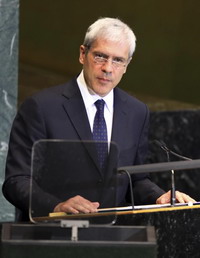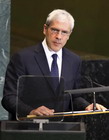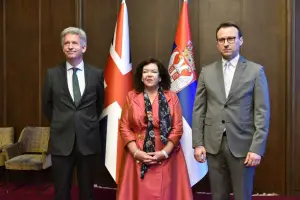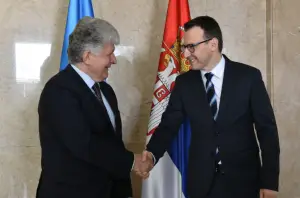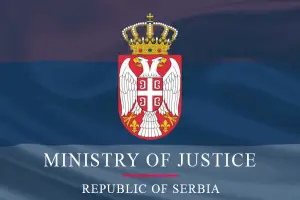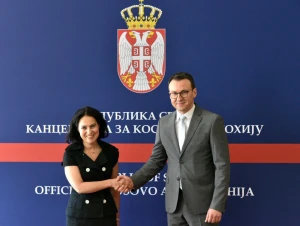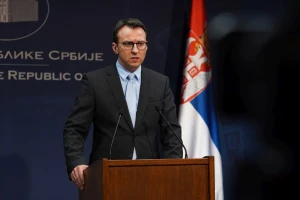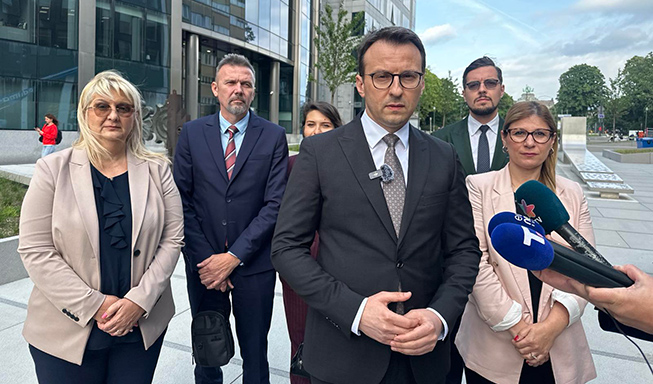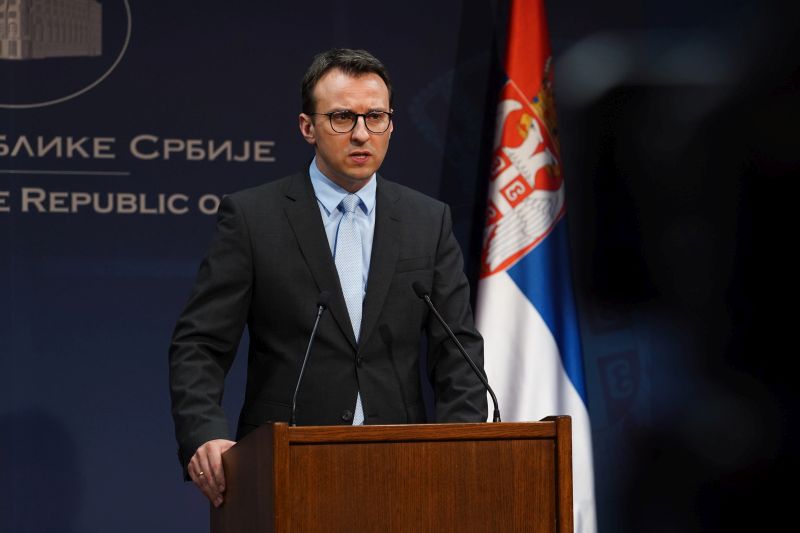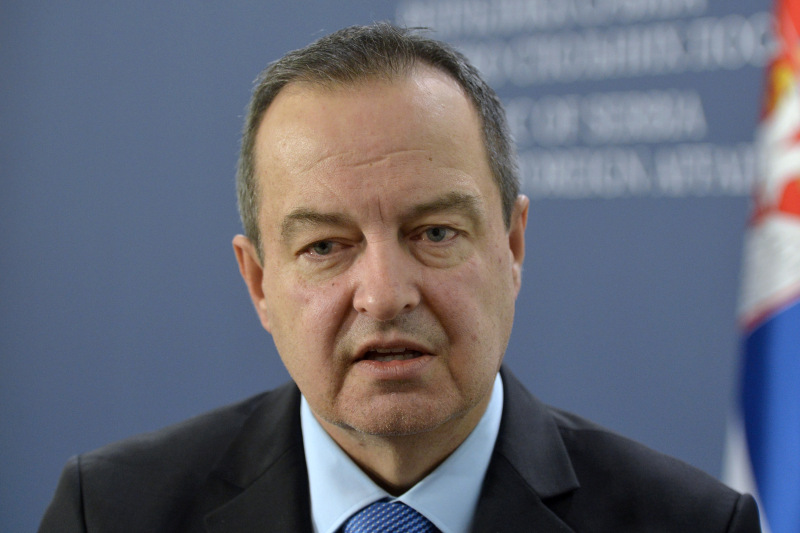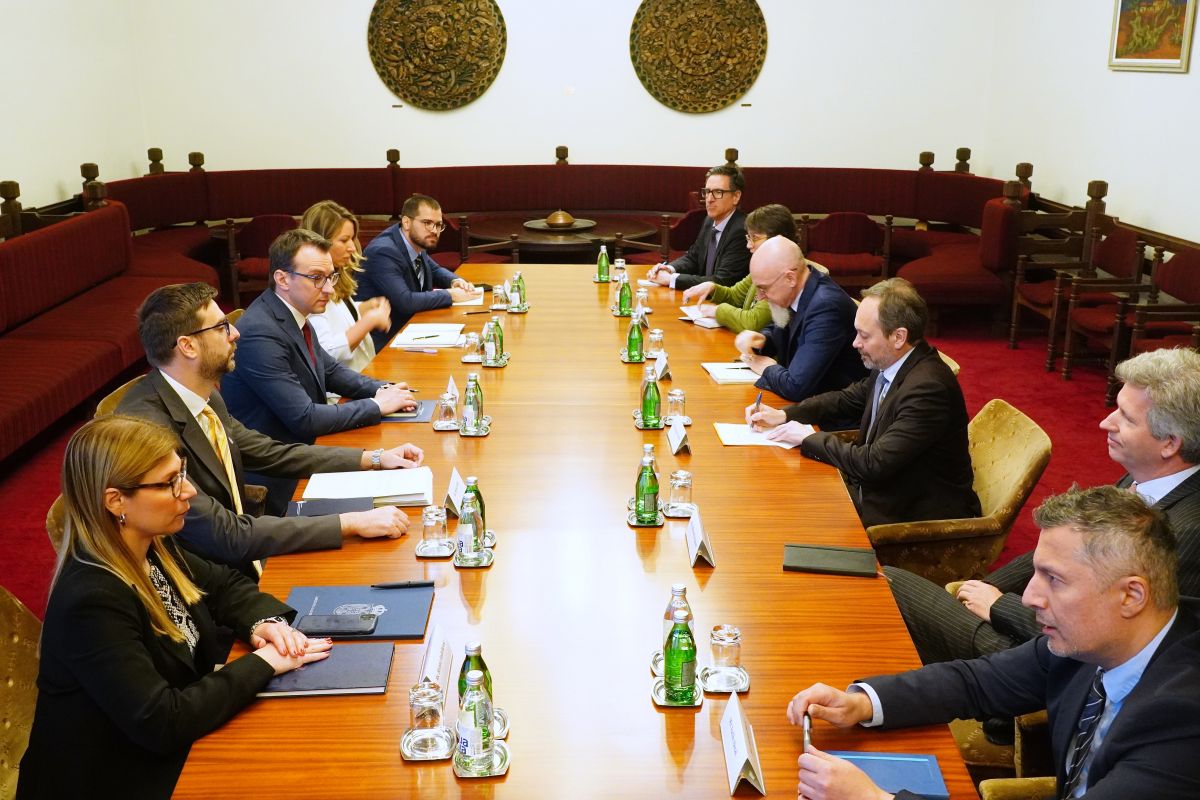Q:
A:
Serbia ready for dialogue on Kosovo
Belgrade/New York,
25 September 2010
Serbian President Boris Tadic stated in New York that Serbia is ready for dialogue with Pristina, believing that the leading role of the UN Security Council in defining a comprehensive solution to the Kosovo issue will remain predominant and will give legitimacy to the outcome of the process.
Tadic, who is heading the Serbian delegation at the 65th session of the UN General Assembly, said in a speech at the general debate that Serbia's position has not changed and that our country will never recognise the unilateral independence of Kosovo, either explicitly or implicitly.
He, however, stressed that Serbia is ready to engage in the process hoping that it will lead to a mutually acceptable compromise solution to the problem of Kosovo, within the globally accepted UN law.
The Serbian President recalled that the Belgrade-Pristina dialogue was enabled through a Joint Resolution by Serbia and the EU on the advisory opinion of the International Court of Justice (ICJ), recently adopted by the UN General Assembly.
The Resolution is essentially status-neutral, and any other interpretation is not true, declared Tadic, adding that Serbia is waiting for inclusion in a process that should lead to a mutually acceptable compromise solution to the Kosovo problem.
He reiterated that the unilateral secession of Kosovo was an attempt to violate the basic principles of the UN Charter, the Helsinki Act and Resolution 1244.
The President expressed his gratitude to the vast majority of UN member states that abstained from recognising such a unilateral act.
These countries adhere to the obligations under the UN Charter that must respect the sovereignty and territorial integrity of Serbia, the way Serbia adheres to its Constitution, he maintained.
Tadic reinforced that the advisory opinion of the ICJ confirmed that Kosovo remains under UN interim administration and that Resolution 1244 remains in force.
The central and leading role of the Security Council in determining a comprehensive solution to the Kosovo issue remains dominant and will give legitimacy to the result, the Serbian President pointed out and added that the ICJ did not accept the view that the Kosovo case is "sui generis", nor gave the right to self-determination of Kosovo Albanians.
This court decided to examine the language of the unilateral declaration by Kosovo and expressed the view that the text contains nothing that violates international law, Tadic underlined.
The court, therefore, did not approve the province's right to secede from Serbia, nor did it support the view that Kosovo is a sovereign state. The court’s opinion is clear: the unilateral declaration is just an attempt to determine the final status of Kosovo, Tadic explained.
The Serbian President emphasised that our country is ready for talks and called on UN member states to engage in this dialogue, adding that trust is key element for talks to take place.
The two sides will soon meet after many years. We must be patient and focus on the issues that will enable the building of trust on both sides. There will be many topics to discuss and some of them will be complicated, affirmed Tadic.
He also outlined that he believes that further insisting on recognising independence is futile and counterproductive.
It is essential that the UN member states that have not recognised the independence of Kosovo maintain such positions during the process of dialogue.
There is no example of statehood without the consent of the mother country, he illustrated.
Equally damaging would be attempts to change the reality on the ground during the dialogue, stressed Tadic and warned that any attempt to change this reality through the use of force would lead to an immediate termination of dialogue.
When it comes to the Balkans, the Serbian President underscored that he believes that the future of the region lies in reconciliation.
He also recollected that the Serbian parliament adopted a declaration condemning the crime in Srebrenica.
It is essential that the region embraces the EU and adopts the values and culture of contemporary Europe in a way that we accept the Union, Tadic highlighted, adding that Europe is evolving, and so is the Balkan region.
We have to believe that the EU will keep its word that the entire Western Balkans will become part of the Union, and if this does not happen, a geographical, historical and cultural alienation would follow, the President remarked.
Organised crime in the Western Balkans is the single biggest challenge for Serbia but also for the whole region.
We hope that all Western Balkan countries will mark the fight against organised crime as a priority. We owe it to our citizens, our neighbours in the EU and the coming generations, concluded the President.
He, however, stressed that Serbia is ready to engage in the process hoping that it will lead to a mutually acceptable compromise solution to the problem of Kosovo, within the globally accepted UN law.
The Serbian President recalled that the Belgrade-Pristina dialogue was enabled through a Joint Resolution by Serbia and the EU on the advisory opinion of the International Court of Justice (ICJ), recently adopted by the UN General Assembly.
The Resolution is essentially status-neutral, and any other interpretation is not true, declared Tadic, adding that Serbia is waiting for inclusion in a process that should lead to a mutually acceptable compromise solution to the Kosovo problem.
He reiterated that the unilateral secession of Kosovo was an attempt to violate the basic principles of the UN Charter, the Helsinki Act and Resolution 1244.
The President expressed his gratitude to the vast majority of UN member states that abstained from recognising such a unilateral act.
These countries adhere to the obligations under the UN Charter that must respect the sovereignty and territorial integrity of Serbia, the way Serbia adheres to its Constitution, he maintained.
Tadic reinforced that the advisory opinion of the ICJ confirmed that Kosovo remains under UN interim administration and that Resolution 1244 remains in force.
The central and leading role of the Security Council in determining a comprehensive solution to the Kosovo issue remains dominant and will give legitimacy to the result, the Serbian President pointed out and added that the ICJ did not accept the view that the Kosovo case is "sui generis", nor gave the right to self-determination of Kosovo Albanians.
This court decided to examine the language of the unilateral declaration by Kosovo and expressed the view that the text contains nothing that violates international law, Tadic underlined.
The court, therefore, did not approve the province's right to secede from Serbia, nor did it support the view that Kosovo is a sovereign state. The court’s opinion is clear: the unilateral declaration is just an attempt to determine the final status of Kosovo, Tadic explained.
The Serbian President emphasised that our country is ready for talks and called on UN member states to engage in this dialogue, adding that trust is key element for talks to take place.
The two sides will soon meet after many years. We must be patient and focus on the issues that will enable the building of trust on both sides. There will be many topics to discuss and some of them will be complicated, affirmed Tadic.
He also outlined that he believes that further insisting on recognising independence is futile and counterproductive.
It is essential that the UN member states that have not recognised the independence of Kosovo maintain such positions during the process of dialogue.
There is no example of statehood without the consent of the mother country, he illustrated.
Equally damaging would be attempts to change the reality on the ground during the dialogue, stressed Tadic and warned that any attempt to change this reality through the use of force would lead to an immediate termination of dialogue.
When it comes to the Balkans, the Serbian President underscored that he believes that the future of the region lies in reconciliation.
He also recollected that the Serbian parliament adopted a declaration condemning the crime in Srebrenica.
It is essential that the region embraces the EU and adopts the values and culture of contemporary Europe in a way that we accept the Union, Tadic highlighted, adding that Europe is evolving, and so is the Balkan region.
We have to believe that the EU will keep its word that the entire Western Balkans will become part of the Union, and if this does not happen, a geographical, historical and cultural alienation would follow, the President remarked.
Organised crime in the Western Balkans is the single biggest challenge for Serbia but also for the whole region.
We hope that all Western Balkan countries will mark the fight against organised crime as a priority. We owe it to our citizens, our neighbours in the EU and the coming generations, concluded the President.

